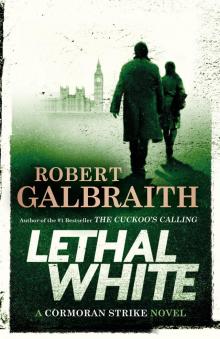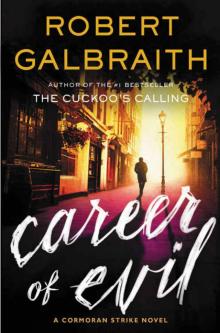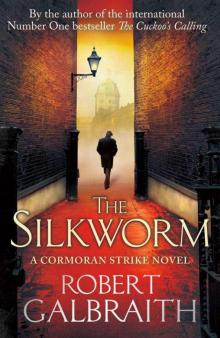- Home
- Robert Galbraith
Lethal White Page 4
Lethal White Read online
Page 4
Henrik Ibsen, Rosmersholm
Such is the universal desire for fame that those who achieve it accidentally or unwillingly will wait in vain for pity.
For many weeks after the capture of the Shacklewell Ripper, Strike had feared that his greatest detective triumph might have dealt his career a fatal blow. The smatterings of publicity his agency had hitherto attracted seemed now like the two submersions of the drowning man before his final descent to the depths. The business for which he had sacrificed so much, and worked so hard, relied largely on his ability to pass unrecognized in the streets of London, but with the capture of a serial killer he had become lodged in the public imagination, a sensational oddity, a jokey aside on quiz shows, an object of curiosity all the more fascinating because he refused to satisfy it.
Having wrung every last drop of interest out of Strike’s ingenuity in catching the Ripper, the papers had exhumed Strike’s family history. They called it “colorful,” though to him it was a lumpen internal mass that he had carried with him all his life and preferred not to probe: the rock star father, the dead groupie mother, the army career that ended with the loss of half his right leg. Grinning journalists bearing checkbooks had descended on the only sibling with whom he had shared a childhood, his half-sister, Lucy. Army acquaintances had given off-the-cuff remarks that, shorn of what Strike knew was rough humor, assumed the appearance of envy and disparagement. The father whom Strike had only met twice, and whose surname he did not use, released a statement through a publicist, implying a non-existent, amicable relationship that was proceeding far from prying eyes. The aftershocks of the Ripper’s capture had reverberated through Strike’s life for a year, and he was not sure they were spent yet.
Of course, there was an upside to becoming the best-known private detective in London. New clients had swarmed to Strike in the aftermath of the trial, so that it had become physically impossible for him and Robin to cover all the jobs themselves. Given that it was advisable for Strike to keep a low profile for a while, he had remained largely office-bound for several months while subcontracted employees—mostly ex-police and military, many from the world of private security—took on the bulk of the work, Strike covering nights and paperwork. After a year of working on as many jobs as the enlarged agency could handle, Strike had managed to give Robin an overdue pay rise, settle the last of his outstanding debts and buy a thirteen-year-old BMW 3 series.
Lucy and his friends assumed that the presence of the car and additional employees meant that Strike had at last achieved a state of prosperous security. In fact, once he had paid the exorbitant costs of garaging the car in central London and met payroll, Strike was left with almost nothing to spend on himself and continued to live in two rooms over the office, cooking on a single-ringed hob.
The administrative demands freelance contractors made and the patchy quality of the men and women available to the agency were a constant headache. Strike had found only one man whom he had kept on semi-permanently: Andy Hutchins, a thin, saturnine ex-policeman ten years older than his new boss, who had come highly recommended by Strike’s friend in the Met, Detective Inspector Eric Wardle. Hutchins had taken early retirement when he had been struck by a sudden bout of near-paralysis of his left leg, followed by a diagnosis of multiple sclerosis. When he had applied for contract work, Hutchins had warned Strike that he might not always be fit; it was, he explained, an unpredictable disease, but he had not relapsed in three years. He followed a special low-fat diet that to Strike sounded positively punitive: no red meat, no cheese, no chocolate, nothing deep-fried. Methodical and patient, Andy could be trusted to get the job done without constant supervision, which was more than could be said for any of Strike’s other hires apart from Robin. It seemed incredible to him, still, that she had walked into his life as a temporary secretary to become his partner and outstanding colleague.
Whether they were still friends, though, was another question.
Two days after Robin and Matthew’s wedding, when the press had driven him out of his flat, while it was still impossible to turn on the TV without hearing his own name, Strike had sought refuge, in spite of invitations from friends and his sister, in a Travelodge near Monument station. There he had attained the solitude and privacy he craved; there he had been free to sleep for hours undisturbed; and there he had downed nine cans of lager and become increasingly desirous of speaking to Robin with each empty can that he threw, with diminishing accuracy, across the room into the bin.
They had had no contact since their hug on the stairs, to which Strike’s thoughts had turned repeatedly in the ensuing days. He was sure that Robin would be going through a hellish time, holed up in Masham while deciding whether to pursue a divorce or an annulment, arranging the sale of their flat while dealing with both press and family fallout. What exactly he was going to say when he reached her, Strike did not know. He only knew that he wanted to hear her voice. It was at this point, drunkenly searching his kit bag, that he discovered that in his sleep-deprived haste to leave his flat, he had not packed a recharging lead for his mobile, which was out of battery. Undeterred, he had dialed directory inquiries and succeeded, after many requests to repeat himself more clearly, in getting connected to Robin’s parents’ house.
Her father had answered.
“Hi, c’n’I speak t’Robinplease?”
“To Robin? I’m afraid she’s on her honeymoon.”
For a muzzy moment or two, Strike had not quite comprehended what he had been told.
“Hello?” Michael Ellacott had said, and then, angrily, “I suppose this is another journalist. My daughter’s abroad and I would like you to stop calling my house.”
Strike had hung up, then continued to drink until he passed out.
His anger and disappointment had lingered for days and were in no way abated by his awareness that many would say that he had no claims upon his employee’s private life. Robin wasn’t the woman he had thought her if she could have got meekly on a plane with the man he mentally referred to as “that twat.” Nevertheless, something close to depression weighed upon him while he sat in his Travelodge with his brand-new recharging lead and more lager, waiting for his name to disappear from the news.
Consciously seeking to distract himself from thoughts of Robin, he had ended his self-imposed isolation by accepting an invitation that he would usually have avoided: dinner with Detective Inspector Eric Wardle, Wardle’s wife April and their friend Coco. Strike knew perfectly well that he was being set up. Coco had previously tried to find out through Wardle whether Strike was single.
She was a small, lithe, very pretty girl with tomato-red hair, a tattoo artist by trade and a part-time burlesque dancer. He ought to have read the danger signs. She was giggly and slightly hysterical even before they started drinking. Strike had taken her to bed in the Travelodge in the same way he had drunk nine cans of Tennent’s.
Coco had taken some shaking loose in the weeks that followed. Strike did not feel good about it, but one advantage of being on the run from the press was that one-night stands found it far harder to track you down.
One year on, Strike had no idea why Robin had chosen to remain with Matthew. He supposed her feelings for her husband ran so deep that she was blind to what he really was. He was in a new relationship himself, now. It had lasted ten months, the longest since he had split up with Charlotte, who had been the only woman whom he had ever contemplated marrying.
The emotional distance between the detective partners had become a simple fact of daily existence. Strike could not fault Robin’s work. She did everything she was told promptly, meticulously and with initiative and ingenuity. Nevertheless, he had noticed a pinched look that had never been there before. He thought her slightly jumpier than usual and, once or twice while parceling out work between his partner and subcontractors, he had caught an uncharacteristic blank, unfocused expression that troubled him. He knew some of the signs of post-traumatic stress disorder and she had now survived two near-fatal
attacks. In the immediate aftermath of losing half his leg in Afghanistan, he, too, had experienced dissociation, finding himself suddenly and abruptly removed from his present surroundings to those few seconds of acute foreboding and terror that had preceded the disintegration of the Viking in which he had been sitting, and of his body and military career. He had been left with a deep dislike of being driven by anybody else and, to this day, with dreams of blood and agony that sometimes woke him, bathed in sweat.
However, when he had attempted to discuss Robin’s mental health in the calm, responsible tones of her employer, she had cut him off with a finality and a resentment that he suspected could be traced to the sacking. Thereafter, he had noticed her volunteering for trickier, after-dark assignments and it had been something of a headache to arrange work so that he did not appear to be trying, as in fact he was, to keep her on the safest, most mundane jobs.
They were polite, pleasant and formal with each other, talking about their private lives in the broadest brushstrokes, and then only when necessary. Robin and Matthew had just moved house and Strike had insisted that she take a full week off to do it. Robin had been resistant, but Strike had overruled her. She had taken very little leave all year, he reminded her, in a tone that brooked no argument.
On Monday, the latest of Strike’s unsatisfactory subcontractors, a cocky ex–Red Cap Strike had not known while in the service, had driven his moped into the rear of a taxi he was supposed to be tailing. Strike had enjoyed sacking him. It had given him somebody on whom to vent his anger, because his landlord had also chosen this week to inform Strike that, along with nearly every other owner of office space in Denmark Street, he had sold out to a developer. The threat of losing both office and home now loomed over the detective.
To set the seal on a particularly shitty few days, the temp he had hired to cover basic paperwork and answer the phone in Robin’s absence was as irritating a woman as Strike had ever met. Denise talked nonstop in a whiny, nasal voice that carried even through the closed door of his inner office. Strike had latterly resorted to listening to music on headphones, with the result that she had had to bang on the door repeatedly and shout before he heard her.
“What?”
“I’ve just found this,” said Denise, brandishing a scribbled note in front of him. “It says ‘clinic’… there’s a word beginning with ‘V’ in front… the appointment’s for half an hour’s time—should I have reminded you?”
Strike saw Robin’s handwriting. The first word was indeed illegible.
“No,” he said. “Just throw it away.”
Mildly hopeful that Robin was quietly seeking professional help for any mental problems she might be suffering, Strike replaced his earphones and returned to the report he was reading, but found it hard to concentrate. He therefore decided to leave early for the interview he had scheduled with a possible new subcontractor. Mainly to get away from Denise, he was meeting the man in his favorite pub.
Strike had had to avoid the Tottenham for months in the aftermath of his capture of the Shacklewell Ripper, because journalists had lain in wait for him here, word having got out that he was a regular. Even today, he glanced around suspiciously before deciding that it was safe to advance on the bar, order his usual pint of Doom Bar and retire to a corner table.
Partly because he had made an effort to give up the chips that were a staple of his diet, partly because of his workload, Strike was thinner now than he had been a year ago. The weight loss had relieved pressure on his amputated leg, so that both the effort and the relief of sitting were less noticeable. Strike took a swig of his pint, stretching his knee from force of habit and enjoying the relative ease of movement, then opened the cardboard file he had brought with him.
The notes within had been made by the idiot who had crashed his moped into the back of the taxi, and they were barely adequate. Strike couldn’t afford to lose this client, but he and Hutchins were struggling to cover workload as it was. He urgently needed a new hire, and yet he wasn’t entirely sure that the interview he was about to conduct was wise. He had not consulted Robin before making the bold decision to hunt down a man he had not seen for five years, and even as the door of the Tottenham opened to admit Sam Barclay, who was punctual to the minute, Strike was wondering whether he was about to make an almighty mistake.
He would have known the Glaswegian almost anywhere as an ex-squaddie, with his T-shirt under his thin V-neck jumper, his close-cropped hair, his tight jeans and over-white trainers. As Strike stood up and held out his hand, Barclay, who appeared to have recognized him with similar ease, grinned and said:
“Already drinking, aye?”
“Want one?” asked Strike.
While waiting for Barclay’s pint, he watched the ex-Rifleman in the mirror behind the bar. Barclay was only a little over thirty, but his hair was prematurely graying. He was otherwise exactly as Strike remembered. Heavy browed, with large round blue eyes and a strong jaw, he had the slightly beaky appearance of an affable owl. Strike had liked Barclay even while working to court-martial him.
“Still smoking?” Strike asked, once he’d handed over the beer and sat down.
“Vapin’ now,” said Barclay. “We’ve had a baby.”
“Congratulations,” said Strike. “On a health kick, then?”
“Aye, somethin’ like that.”
“Dealing?”
“I wasnae dealin’,” said Barclay hotly, “as you fuckin’ well know. Recreational use only, pal.”
“Where are you buying it now, then?”
“Online,” said Barclay, sipping his pint. “Easy. First time I did it, I thought, this cannae fuckin’ work, can it? But then I thought, ‘Och, well, it’s an adventure.’ They send it to you disguised in fag packets and that. Choose off a whole menu. Internet’s a great thing.”
He laughed and said, “So whut’s this all about? Wasnae expectin’ to hear from you anytime soon.”
Strike hesitated.
“I was thinking of offering you a job.”
There was a beat as Barclay stared at him, then he threw back his head and roared with laughter.
“Fuck,” he said. “Why didn’t ye say that straight off, like?”
“Why d’you think?”
“I’m no vapin’ every night,” said Barclay earnestly. “I’m no, seriously. The wife doesnae like it.”
Strike kept his hand closed on the file, thinking.
He had been working a drugs case in Germany when he had run across Barclay. Drugs were bought and sold within the British army as in every other part of society, but the Special Investigation Branch had been called in to investigate what appeared to be a rather more professional operation than most. Barclay had been fingered as a key player and the discovery of a kilo brick of prime Moroccan hash among his effects had certainly justified an interview.
Barclay insisted that he had been stitched up and Strike, who was sitting in on his interrogation, was inclined to agree, not least because the Rifleman seemed far too intelligent not to have found a better hiding place for his hashish than the bottom of an army kit bag. On the other hand, there was ample evidence that Barclay had been using regularly, and there was more than one witness to the fact that his behavior was becoming erratic. Strike felt that Barclay had been lined up as a convenient scapegoat, and decided to undertake a little side excavation on his own.
This threw up interesting information relating to building materials and engineering supplies that were being reordered at a thoroughly implausible rate. While it was not the first time that Strike had uncovered this kind of corruption, it so happened that the two officers in charge of these mysteriously vanishing and highly resalable commodities were the very men so keen to secure Barclay’s court martial.
Barclay was startled, during a one-to-one interview with Strike, to find the SIB sergeant suddenly interested, not in hashish, but in anomalies relating to building contracts. At first wary, and sure he would not be believed given the situation in whi
ch he found himself, Barclay finally admitted to Strike that he had not only noticed what others had failed to see, or chosen not to inquire into, but begun to tabulate and document exactly how much these officers were stealing. Unfortunately for Barclay, the officers in question had got wind of the fact that he was a little too interested in their activities, and it was shortly after this that a kilo of hashish had turned up in Barclay’s effects.
When Barclay showed Strike the record he had been keeping (the notebook had been hidden a good deal more skillfully than the hashish), Strike had been impressed by the method and initiative it displayed, given that Barclay had never been trained in investigative technique. Asked why he had undertaken the investigation for which nobody was paying, and which had landed him in so much trouble, Barclay had shrugged his broad shoulders and said “no right, is it? That’s the army they’re robbin’. Taxpayers’ money they’re fuckin’ pocketin’.”
Strike had put in many more hours on the case than his colleagues felt was merited, but finally, with Strike’s additional investigations into the matter to add weight, the dossier on his superiors’ activities that Barclay had compiled led to their conviction. The SIB took credit for it, of course, but Strike had made sure that accusations against Barclay were quietly laid to rest.
“When ye say ‘work,’” Barclay wondered aloud now, as the pub hummed and tinkled around them, “ye mean detective stuff?”
Strike could see that the idea appealed.
“Yeah,” said Strike. “What have you been doing since I last saw you?”
The answer was depressing, though not unexpected. Barclay had found it hard to get or keep a regular job in the first couple of years out of the army and had been doing a bit of painting and decorating for his brother-in-law’s company.
“The wife’s bringin’ in most o’ the money,” he said. “She’s got a good job.”
“OK,” said Strike, “I reckon I can give you a couple of days a week for starters. You’ll bill me as a freelancer. If it doesn’t work out, either of us can walk away at any time. Sound fair?”

 Lethal White
Lethal White The Cuckoo's Calling
The Cuckoo's Calling Career of Evil
Career of Evil The Silkworm
The Silkworm